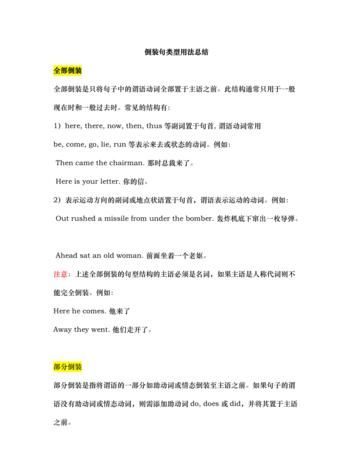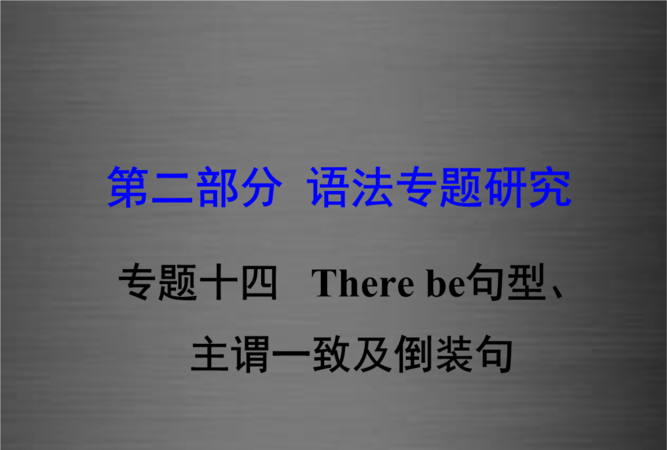本文目录
be的倒装句表示让步
例句:here
is
your
change.
翻译:这是(找给)你的零钱.
正常顺序:your
change
is
here.
例句:were
John
here,it
would
not
be
a
problem.
翻译:如果john在这,这个问题就
不是问题
了
正常:if
john
were
here,it
would
not
be
a
problem.
第一句是全部倒装,把整个谓语(is
here)放到主语前,第二个是部分倒装,只将谓语(were
here)的一部分放到主语前

英语六级语法知识点整理
虚拟语气式专门表达假设意义和其他非事实意义的动词形式,只有两种形式:Be-型虚拟式和Were-型虚拟式。
Be-型虚拟式:以动词原形表示,不管主语是什么人称,动词一律用原形。动词为被动态,助动词Be也是用原形,如IBe sent, you be sent .
1.主要用于表示命令,决定,建议等词语之后的that-分句中。动词(decide,demand,insist,order, propose等),形容词(appropriate,desirable, important,necessary等)名词形式(decision, demand, order, requirement等)。
He ordered that all the books be sent now。
It is essential that all work be examined。
Your advice that she wait till next week is reasonable。
2.用于由If,though,whatever,lest,so long as, whether等引导的分句中。表示揣测,让步,防备等。
Though everyone desert you, I will not.
3.用于某些公式化语句中。表示祝愿,诅咒,禁止等。
God bless/damn you.(神保佑你、该死的)
Heaven forbid 天理不容
so be it。但愿如此
were-型虚拟式只有一种形式,不管主语是什么人称,动词一律用were,I were, you were, he were.如动词为进行体或被动态,I were going , you were going, I were sent,he were sent.
1,用于某些状语分句中。由if, even if ,if only , even though,though引导的条件状语或让步状语分句中,表示非真实的条件或让步。
If i wer you, I should go .
2.用于某些名词性分句中,由wish, would rather ,suppose, imagine等引导的that-分句中,表示一种臆想的(通常是不可能发生的)情况
I wish it were spring all the year.
倒装句
1,句首状语为方位词或拟声词,谓语动词为go,come等表示位置转移的动态动词是,通常用全部倒装。
bang,bang,bang ,come the robbers。
the door burst open and in crushed the crowd。
主语是代词就不用倒装,lower and lower he bent。
2、句首状语为表示地点的介词词组时,会引起局部倒装
in this chapter will be found a particular answer。
3、句首状语为否定词或带有否定意义的词语时,一般引起局部倒装。
Never have I found him in such a good mood。
4、当句首状语由“only+ 副词”、“only+ 介词词组”、“only+状语分句”构成,也可引起局部倒装。
Only yesterday did he find out his book。
Only through this way could you get there。
Only because it rained did not we go there。
以关联连词not only (…but also)开头的分句。往往引起局部倒装。
Not only did he complain about the food,he also refused to pay for it。
5、在以关联连词so(…that)开头的句子结构中,“so+形容词”是主语补语的前置,“so+副词”是状语的前置,前者引起全部倒装,后者引起局部倒装。
So small was the mark that I could hardly see it。
So much does he worry about his work that he can not sleep at night。
6、当方式状语、频度状语等移至句首时,有时也引起局部倒装。
Many a time has Mike given me good advice。

be动词倒装句例句
be动词在两种倒装句中都有放在主语前。例如:
1、全部倒装:Here are the books!
这是书!
2、 部分倒装:Not only is he a professor but also he is a musician.
他不仅是教授,而且还是音乐家。

全部倒装的的用法
1、表示方向、地点和时间的副词、介词短语置于句首用完全倒装。这种用法的倒转句,常见于口语对话中,英语书面语种较少出现这种用法。
例句:here comes the bus(车到这来了),在这个例句中,主语“the bus”被后置,这就是为了强调车“来”的这一动作。
2、表语+连系动词+主语(表语是形容词、介词短语、动词ing形式、过去分词等)。这种用法的完全倒装句可用于口头表达,也可用于书面表达。
例句:such are the facts ,no one can deny them(这就是事实,没有人可以否认),该例句强调事实的重要性。
虚拟条件句的倒装例子
虚拟条件从句中谓语动词用一般过去式,主句用“would/should/might/could+动词原形”形式,表示对现在不可能实现情况的假想。虚拟条件句的从句部分如果含有were, should, 或had, 可将if省略,再把were, should或had 移到从句句首,实行倒装。需要注意,在虚拟语气的从句中,动词'be'的过去时态一律用"were",不用was, 即在从句中be用were代替。
虚拟条件句往往指不能实现或纯假想的情况,可以对过去、现在或将来进行假想。虚拟语气的本质就是对根本不可能的情况发生假设。

例句:
(1)Were they here now, they could help us.=If they were here now, they could help us.
如果他们现在在这里,就能帮助我们了。
(2)Had you come earlier, you would have met him.=If you had come earlier, you would have met him.
如果你早点来,就能遇见他了。
(3)If I were you, I would go to look for him.
如果我是你,就会去找他。
(4)If he were here, everything would be all right.
如果他在这儿,一切都会好的。
扩展资料:
虚拟条件句分类:
1、对现在情况的虚拟
条件从句中谓语动词用一般过去式,主句用“would/should/might/could+动词原形”形式,表示对现在不可能实现情况的假想。
If I were you,I would choose to work in a small town.
如果我是你,我会选择在小城镇工作。(事实上我不是你)
2、对过去情况的虚拟
条件从句中谓语动词用过去完成式,主语用“would/could/should/might+have+动词的过去分词”形式。
If it had not been for your help yesterday,I could not have caught the bus.
如果昨天没有你的帮助,我不会赶上公交车。(事实是你昨天已经帮助了我,所以我赶上了车)
3、对将来情况的虚拟
在表示与将来事实相反的条件从句中,谓语动词可用should do,were to do或动词的过去式三种形式表示,但意义略有不同。should表示的可能性最大,动词过去式的可能性次之,were to do 的可能性最小。
If things were to be twice,all would be wise.
假如凡事都可以重新做一次,人人皆可成为聪明人。(事实是并不是所有的事都可以重新做一次)
参考资料来源:百度百科-虚拟条件句
以上就是关于be型虚拟式倒装 ,be的倒装句表示让步的全部内容,以及be型虚拟式倒装 的相关内容,希望能够帮到您。
